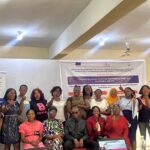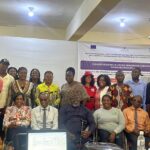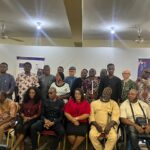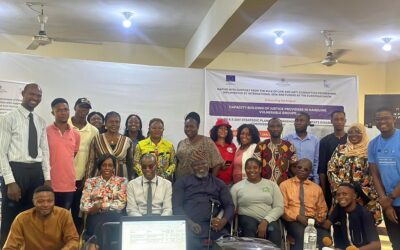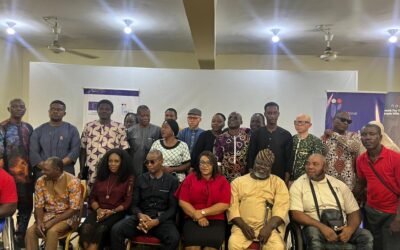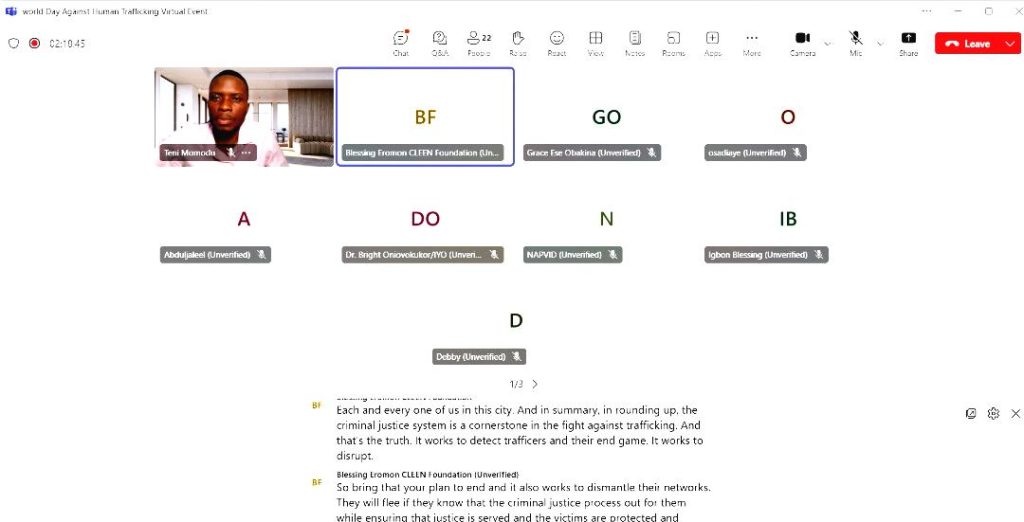
On July 30, 2025, the World Day Against Human Trafficking, a virtual dialogue hosted from Nigeria’s trafficking flashpoint — Edo State — sent a piercing message to the world: trafficking is not only a human rights crisis, it is an organized criminal enterprise. And its antidote must be equally strategic, coordinated, and survivor-led.
Organized by Kairos Youth Empowerment Initiative (KYEI) in partnership with NAPVID, CLEEN Foundation, Caring Heart Initiative, and CONGOs, the event brought together survivors, legal advocates, community leaders, and justice actors to dissect the layers of exploitation and design real, actionable change.
The dialogue began with an honest, no-fluff address by Dr. Paul Oyarenua of KYEI. He framed the discussion around the 2025 global campaign theme: “Human Trafficking is Organized Crime – End the Exploitation.” According to him, the trafficking problem in Edo is systemic — not a matter of individual greed or ignorance, but a web of poverty, weak enforcement, cultural complicity, and institutional failure.
His call to action was unmissable: if trafficking is organized crime, then our response must be equally structured, strategic, and survivor centered.
Session One: Law Enforcement at a Crossroads
Facilitator: Mrs. Blessing Eromon (CLEEN Foundation)
The first technical presentation was delivered by Mrs. Blessing Eromon, Program Officer at CLEEN Foundation. She focused on the crucial and often under-resourced role of law enforcement agencies in the fight against human trafficking. According to her, officers on the frontlines—especially the police, immigration officials, National Agency for the Prohibition of Trafficking in Persons (NAPTIP) and other security operatives—are frequently the first point of contact with victims or traffickers. However, many of these officers lack the necessary training to identify trafficking indicators, conduct trauma-informed interrogations, or respond in ways that protect the rights of victims.
Blessing Eromon delivered a detailed exposition on the pivotal role that law enforcement agencies play in the fight against human trafficking. She framed law enforcement officers as frontline defenders whose actions critically determine whether traffickers are brought to justice and victims receive protection.
Through a personal narrative involving a relative’s near entrapment in a trafficking scheme, Blessing illustrated the complexity behind rescue operations, demonstrating how some victims are unaware of their exploitation until law enforcement intervenes. She emphasized that rescue is just the beginning; protection must encompass comprehensive victim support services including medical care, shelter, counseling, and legal assistance.
Blessing articulated the essential function of prevention, underscoring the value of community education and public awareness campaigns. She advocated collaboration with schools, religious institutions, transport sectors, and local leaders to raise vigilance and empower individuals to resist attempts to trafficking. The increasingly indiscriminate nature of trafficking across gender and age demands widespread sensitization.
Moreover, Blessing highlighted the necessity of partnerships between law enforcement, immigration and border agencies, civil society organizations, international bodies, and social workers to create a unified front against trafficking. She shared field experiences underscoring the power of intelligence-led operations and multi-agency task forces in dismantling trafficking rings.
Finally, Blessing stressed the critical importance of professionalism, compassion, and respect for human rights in law enforcement conduct. Training to avoid secondary victimization during investigations, adherence to human rights standards, and coordination with community stakeholders were presented as cornerstones for effective and ethical enforcement.
 Session Two: From Rescue to Recovery – Rethinking Victim Support
Session Two: From Rescue to Recovery – Rethinking Victim Support
Facilitator: Ms. Grace Ese Obakina (Caring Heart Initiative)
The second session was presented by Ms. Grace Ese Obakina, Executive Director of Caring Heart Initiative. Her presentation focused on the state of referral pathways and support systems available to victims of trafficking post-rescue. Ms. Obakina began by acknowledging the tremendous psychological, physical, and social trauma experienced by victims, and emphasized that recovery must go beyond temporary shelter. Drawing from her organization’s experience, she pointed out that victims often face re-victimization, stigma, and even retaliation if systems are not properly coordinated.
She emphasized the need for structured, well-funded referral pathways that include healthcare, legal aid, psychosocial support, and economic reintegration programs. Ms. Obakina also highlighted the gaps in disability inclusion, noting that victims with physical or psychosocial disabilities are often neglected in traditional support frameworks. She called for a more inclusive, long-term and multi-sectoral rehabilitation approach that allows survivors to regain agency over their lives. Her session reinforced the need for effective coordination between shelters, social workers, law enforcement, and justice actors.
Session Three: Justice Delayed, Justice Denied
Facilitator: Mrs. Blessing Eromon
In the final session she facilitated, Blessing Eromon provided an insightful examination of the fundamental role of the criminal justice system in the struggle to dismantle organized trafficking networks. She framed the criminal justice system not only as a mechanism for prosecuting offenders but also as a critical pillar for delivering justice to victims and disrupting the operational capacities of traffickers.
Blessing began by emphasizing the complexity and sophistication of trafficking networks, describing them as highly organized criminal enterprises that require a strategic and coordinated response. She stressed that effective dismantling of these networks rests on the ability of the criminal justice system to act decisively through comprehensive investigation, prosecution, and sentencing processes. Key to success is the deployment of intelligence-led operations that can trace and intercept trafficking activities at multiple points, including recruitment, transportation, and exploitation phases.
She highlighted the importance of seamless collaboration between law enforcement agencies, the judiciary, prosecution services, and specialized anti-trafficking units to ensure that investigations translate into successful convictions without retraumatizing victims. Blessing underscored that victims’ testimonies need protection and legal support to withstand scrutiny in court, and that witness protection programs are vital to securing their safety and cooperation.
Moreover, she elaborated on the critical need for capacity building within the criminal justice system — continuous training for judges, prosecutors, and law enforcement officers to deepen their understanding of the nuances of trafficking crimes and to apply the law sensitively and competently. Emphasis was also placed on monitoring and evaluation mechanisms within the system to measure the effectiveness of interventions and to inform policy reforms.
Blessing concluded by reinforcing that dismantling trafficking networks is not only about law enforcement actions but also requires a justice system that visibly prioritizes victim rights, ensures accountability, and sends a strong deterrent signal to criminals involved in trafficking.
 Voices from the Ground: Participants Tell Their Stories
Voices from the Ground: Participants Tell Their Stories
The most powerful moments came not from the speakers, but from the participants. Their stories weren’t abstract — they were lived realities, bringing the data to life.
-
Evangelist Vera shared how her nephew was trafficked to Burkina Faso under the guise of a tech job. He was trapped, forced to recruit others, and nearly lost his life before escaping. “He was told he’d earn 500,000 a month… It turned out to be Yahoo work. She described the trauma he endured and how prayers and luck helped him escape. “He went through hell. The person who took him was even a church member. It’s sad.” She emphasized that trafficking is not limited to women—boys are victims too, often trafficked for cybercrime or forced labor.
-
Dr. Bright Oniovokukor lamented how political elites and celebrities romanticize life abroad, feeding dangerous illusions. “Some people prefer to stay in Libya because they believe dying there is better than living here in poverty.”
-
Chibundu Uchegbu delivered a scathing critique of institutional complicity: “Traffickers are protected by compromised security personnel and judicial actors. We must dismantle their networks brick by brick.”
-
Other participants stressed the role of poverty, family betrayal, and misinformation in fueling trafficking. Some called for increased funding for CSOs, targeted education for youth, and stronger protection for whistleblowers.
Findings: What the Dialogue Revealed
The event revealed deep-rooted systemic issues, including:
-
The limited capacity of law enforcement to detect, protect, and prosecute trafficking cases.
-
The fragmentation of victim support services, especially for persons with disabilities.
-
The failure of the justice system to deliver timely, survivor-sensitive prosecutions.
-
The silencing of survivor voices in the design of policies that affect them.
But it also revealed hope — in the form of brave storytelling, bold recommendations, and shared commitment to change.
Recommendations: Building a Path Forward
The collective wisdom of the dialogue called for:
-
Mandatory, trauma-informed training for law enforcement.
-
Survivor-centered and disability-inclusive rehabilitation programs.
-
Dedicated anti-trafficking courts and prosecutors.
-
Grassroots education campaigns, especially in vulnerable communities.
-
Stronger collaboration between CSOs, security agencies, and survivor networks.
Conclusion: The Work Begins Now
This wasn’t just another webinar. It was a manifesto.
The 2025 World Day Against Human Trafficking dialogue lit a fire in the heart of Edo State. Survivors were heard. Experts spoke truth. Institutions were challenged. And everyone left with one clear message:
Human trafficking is not just a crime — it is a betrayal of our shared humanity. And together, we must end it.

